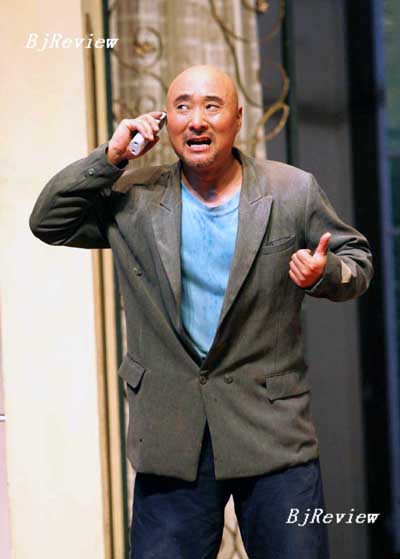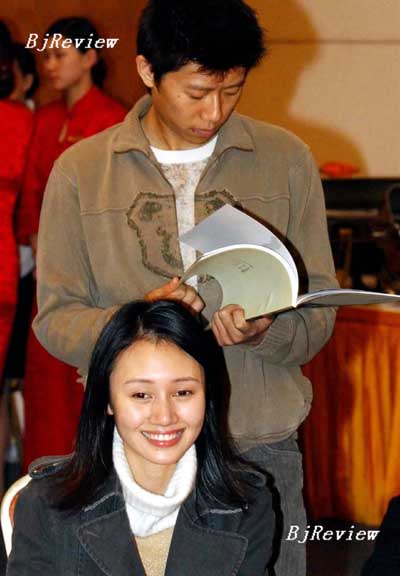| Tools: Save | Print | E-mail | Most Read |
| Crazy for Plays |
| Adjust font size: |
Capital Theater, affiliated to the Beijing People's Art Theater group, has been operating since 1955 and continues to attract audiences. It is also a venue where the Theater's repertoire including Teahouse and Thunderstorm is performed
Lin made a name for blending the visual beauty of traditional dramas with modern plays. His works have achieved dramatic art world and box office success. Now 71 years old, Lin still launches several new plays every year. Drama groups from Germany and Japan have extended invitations for him to direct plays for them. "I will keep on directing plays as long as I can move. And I will be in the audience seats when I am too old to move," Lin once said. I have never been into fancy things. I cannot understand why people are baffled by plays about real life. Today play artists always talk about selling points and box office performance, whether they are big theater productions or small theater productions. I think now stage lacks the "drama spirit." As far as I am concerned, the "drama spirit" refers to unremitting efforts, never yielding and determined innovation. A new model, immature it may be, shows a new world to the audience. This is what gives plays their never-declining vitality. But I am not saying that every play director should create a brand new genre of plays. After all, it is not easy to do so for a single person. I have been directing plays for many years and during this period I have kept asking myself whether plays evolve according to certain principles. I still haven't found the answer. I keep on moving forward, doing whatever I like, regardless of philosophy and theories. It is a very Chinese practice to promote the experience in artistic creation. Actually, I don't think people should be encouraged to follow one particular example. Instead, artists should always be encouraged to break existing models. We now badly need play rebels against tradition. Even in inheriting traditions, we should always hold a suspicious attitude and find our own stand over the process. To be frank, as a director I am devastated if only a few dozen people come to watch my plays. However, I believe we should always let the audience choose plays, rather than the other way round.
Meng's on-stage exploits have stirred up a storm of Chinese "experimental drama" in recent years. So much so that his name has become synonymous with "alternative" theater. In spite of his unorthodoxy, Meng's plays have met great success in small theaters across Beijing. Meng's works, each more stunning than the last, all bear the mark of a Meng-style passion about life, rebellion, humor and satire. His achievements have earned him the reputation of being both popular and avant-garde, a rare feat in the world of art. I think it is unnecessary to give "experimental drama" a definition. Actually, every play director should take an "experimental" approach, which will create an innovative ambience. Chinese play arts developed very fast in the 1980s. In the 1990s some play directors started to express their personality in plays. As for myself, I believed my breakthrough would be in redesigning stage art by rebelling against existing rules. At that time, I felt that I bore the responsibility to innovate in my plays. Back in university, I studied literature. I remembered that I was struck by the sudden exposure to surrealism and magic realism that originated from Western countries. Until then, we had been greatly influenced by revolutionary romanticism from the Soviet Union. We were all of a sudden in great confusion. I believe there is a huge gap between realism and real life. I believe that as an important creation principle realism has covered a lot of things. However, some play directors have misunderstood realism as putting everyday life on the stage without any creativity or imagination. I am totally against it. I believe an artist should guide the public rather than be guided by the public. I always seek tools from China's traditional aesthetics. I understand the destructive part of my work is done out of instinct. Meanwhile, I have been thinking perhaps I should build some things to replace the things I have destroyed. This is what is on my mind recently.
Wei's adaptation of Puccini's famous work Chinese Princess Turandot to Peking opera was taken on a performance tour to Italy, Puccini's hometown, in 1993. In 1995, Wei's makeover of Turandot, performed by the Zigong Chuanju Opera Troupe, which featured dazzling stunts and the distinctive local flavor of southwest China's Sichuan Province, won a staggering 11 awards at the national drama festival. As a stage performance form imported from Western countries, plays in China have abided by the script-core tradition. The playwright remains the soul of a play. A good tradition of Chinese plays is putting a focus on real life. However, many Chinese plays are far from real life and reality. It is important for plays to reflect on social reality, especially the demands of disadvantaged groups. Yet the majority of Chinese plays have failed this mission.
"My business specialty is on plays," he proudly announced. In the last five years, play performances that he has participated in have sold over 400,000 tickets and achieved a total box office income of 60 million yuan. Somebody has questioned my act of shifting to play performances since I was originally a movie person. Although compared with shooting soap operas and movies, stage performance is more demanding on the ability of an actor, especially a comedian, the limitations on stage acting are much less. I felt that I couldn't bear the limitations any longer, just like a fish of 1 meter in length thrown into a pot of less than half a meter wide. Before starting my career on the stage I suspended my work for three years. During this period, the experiences I accumulated through playing in comedy movies kept coming back to me. I decided to move into play staging although most play troupes were losing money. I got to know that many play troupes, while receiving subsidy from the pockets of taxpayers, have staged plays that were so far away from real life. In some troupes, this kind of practice has been carried out for generations. I think it is a kind of deception and irresponsibility toward the audience. I intended to destroy this old tradition by creating works closer to ordinary people's life. I knew that my act would edge a small number of stage professionals out of the labor market, but this is what we have to do to achieve a more buoyant performance market. Most of my plays are about small potatoes in life, most of which are critical and reveal the dark side of society. However, I think the criticism in my plays is positive as it exposes the ailments of society. I believe comedy is all about catering to audience response. Our staff observe audience reactions to every laughable detail we design. If people don't laugh at our debut performance we change it before the next staging. Now the stage is short of excellent comedies and excellent stage comedians. We hope we can create more plays and cultivate a generation of comedy talent.
After winning numerous awards for her roles in movies, launching a considerably successful music album and gracing the covers of countless fashion magazines, Yuan still believes that plays are her favorite. For every student who majored in acting like me, playing a role in a play is a dream. On that account, I consider myself very lucky since I have been active on play stage for many years. We all know that the play market has been at the valley's bottom for many years, but things have been turning round in the last few years. I think the future will be even better since we have nurtured stable audiences in some big cities. I also like playing in TV operas and movies, but I will definitely sacrifice lucrative moneymaking opportunities on the screen for a role in a play since it gives me a lot of self-recognition. One good thing about stage performance is that it can inspire quick progress in acting in a short period of time. As I have played in a large number of excellent plays, I have raised my requirements on TV scripts and wouldn't accept any role in a mediocre TV script. (Beijing Review July 4, 2007) |
| Tools: Save | Print | E-mail | Most Read |
 |
| Related Stories |




